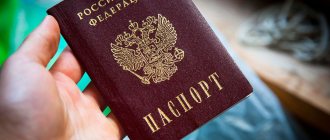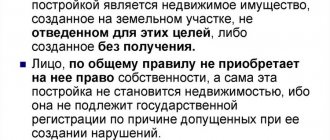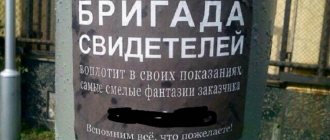ST 175 of the Criminal Code of the Russian Federation.
1. Purchase or sale of property known to have been obtained by criminal means not promised in advance is punishable by a fine in the amount of up to forty thousand rubles or in the amount of the wages or other income of the convicted person for a period of up to three months, or by compulsory labor for a term of up to four hundred eighty hours, or correctional labor for a term of up to two years, or forced labor for a term of up to two years, or imprisonment for the same term.
2. The same acts committed: a) by a group of persons by prior conspiracy; b) in relation to oil and its products, a car or other property on a large scale, - c) has become invalid, - shall be punishable by restriction of freedom for a term of up to three years, or by forced labor for a term of up to five years, or by arrest for a term of up to six months. , or imprisonment for a term of up to five years with a fine of up to eighty thousand rubles or in the amount of wages or other income of the convicted person for a period of up to six months.
3. Acts provided for in parts one or two of this article, committed by an organized group or person using their official position, are punishable by forced labor for a term of up to five years, with or without restriction of freedom for a term of up to two years, or by imprisonment for a term of up to seven years. years with a fine in the amount of up to eighty thousand rubles or in the amount of the wages or other income of the convicted person for a period of up to six months and with or without restriction of freedom for a term of up to two years.
Punishment under Article 175 of the Criminal Code of the Russian Federation for buying stolen goods
If the acquisition of stolen goods was unintentional, then the buyer will not be punished with imprisonment. But he may suffer financially, and a visit from law enforcement officers will bring moral suffering. After all, there is a trial ahead, and before that there are investigative actions.
Note!
This can be avoided provided that before the items reached law enforcement officers, they passed from one owner to another many times.
If people, in search of an opportunity to save money, look for what they need at a flea market, they go to stores with used goods, without knowing anything about where the things come from. It is difficult to convict them of purchasing stolen goods in this situation, but it is important to remember that things may be confiscated or you will have to pay a fine.
What is the penalty for forging a signature?
Today is 327 Art. The Criminal Code of the Russian Federation with commentaries has two compositions, according to which responsibility for forgery of a signature is divided into the forgery itself and the sale of forged documents.
If examined, a counterfeit document will be one that, in the process of certain actions, began to bear the external and qualitative characteristics of the original. Not only the production itself, but also the use for any purpose of a false document will also be considered a crime.
In order to bring the perpetrators to justice, it is necessary to have a falsified document and a professional expert’s opinion confirming the fact of forgery.
It is necessary to have papers with a fictitious signature on hand, because they will serve as physical evidence. However, criminal prosecution for forgery of a signature has a number of features: Liability for forgery of a signature is provided for in Art. 327. Criminal Code of the Russian Federation.
This article contains information regarding the determination of penalties for persons who have committed: forgery of signatures on documents, production or sale of fictitious documents, imitation of awards, forms, stamps or seals. Please also note that criminal prosecution threatens both the manufacturer and the person who used the counterfeit papers.
Legal characteristics
The subject of the crime is property obtained illegally. The situation of illegal trafficking of stolen goods is regulated by the following legislative documents:
- Article 158 of the Criminal Code of the Russian Federation defines the concept of property;
- buying stolen goods - Article 175 of the Criminal Code of the Russian Federation.
The subject of the crime is not necessarily the item that was stolen. It can be any thing obtained illegally. Ownership in the absence of ownership documents will be illegal. In criminal law, acquisition means the ability to possess and use an object.
The crime will look like this:
- the objective party will be the commission of any of the actions: the acquisition or sale of an item over which a crime is committed;
- the subjective side will be the misappropriation of stolen property, both compensated and gratuitous.
Acquisitions are divided into groups:
- promised;
- unpromised.
If the second option is implemented, then the buyer does not have the risk of becoming a participant in a crime and applying for actual imprisonment.
This crime - sale and purchase of stolen goods, Article 175 of the Criminal Code of the Russian Federation, provides for punishment. According to this article, the composition of the crime itself and its qualifying features are determined.
To determine the corpus delicti, the fact of committing one of two actions must be confirmed:
- sales;
- acquisition.
If they exist, the Criminal Code considers that an offense has been committed. The following are the characteristics:
- whether it was committed by one person;
- whether it was committed by a group of people;
- whether there was collusion among a group of persons;
- whether a car was the subject of the crime;
- whether the official position was used.
Commentary to Art. 175 of the Criminal Code
1. The subject of the crime is property known to be obtained by criminal means. The exceptions are: precious metals and natural precious stones, weapons, ammunition, explosive devices, explosives, nuclear materials or radioactive substances, drugs and other items withdrawn from free civilian circulation. The acquisition or sale of such items form signs of independent crimes qualified under Art. 191, 220, 222, 228, 228.1, 234, 242 of the Criminal Code, respectively.
2. The objective side is expressed in the previously not promised acquisition or sale of property obtained by criminal means. If these actions were promised to a person who directly obtained property through a crime, before or during the commission of a crime or in another way (by systematically acquiring from this person property known to be obtained by criminal means), then such an act is qualified as aiding and abetting the crime that resulted in the crime. property.
The article in question does not provide for liability for non-promised storage of property known to have been obtained by criminal means. However, liability for this crime may still accrue to a member of an organized group, including one engaged in the acquisition or sale of property known to have been obtained by criminal means.
3. The acquisition or sale of property known to have been obtained by criminal means is qualified under Art. 174, and not under Art. 175 of the Criminal Code, if the intent of the perpetrator was aimed at giving legal appearance to funds or other property known to be acquired by criminal means.
Responsibility for buying and selling stolen goods
According to Article 175 of the Criminal Code of the Russian Federation, actions can go in two directions: buying or selling illegally acquired items. Before moving on to determining punishment, it is important to qualify four elements:
- The object of the crime is someone else's property or property, illegal circulation of goods.
- When determining the objective side, it becomes clear through what relationships the property was acquired. Important for the investigation will be the place and time of acquisition of the property and the method of its sale. It can not only be sold, but also given as a gift.
- The subject can be a legally capable person over the age of sixteen. The presence of direct intent is important. Anyone who bought stolen goods should know that these are things stolen from other persons and are subject to return according to the law.
Article 175 of the Criminal Code of the Russian Federation for the purchase of stolen goods in Russia indicates that this crime, like other similar ones, may have punishments of varying severity:
- Part one provides that the buyer may face not only a fine of up to forty thousand rubles, but also up to four hundred and eighty hours of compulsory correctional and forced labor or imprisonment.
- Under part two, a person guilty of theft or buying may be punished with five years of forced labor, imprisonment, or a fine of up to eighty thousand rubles. Under the same article, he faces arrest for up to six months or three years of restriction of freedom.
- Buying stolen goods, Article 175 of the Criminal Code of the Russian Federation, part three, means forced labor for up to five years. In this case, this punishment may be supplemented by restriction of freedom for a term of up to two years or imprisonment for a term of up to seven years plus a fine of up to eighty thousand rubles.
Modern methods of legalizing property obtained by criminal means
In order to protect yourself in the future from such unpleasant encounters with servants of the law, you need to know what to pay close attention to when purchasing any item. Some of the most common ways to legalize stolen property:
- Interruption of the identification or serial number is especially common when selling illegal equipment and stolen cars;
- Changing the appearance - for example, if you repaint a car and change its license plates, it can be easily passed off as another by attaching documents corresponding to the new paint;
- Passing through a large number of “hands” - behind a large list of intermediate buyers, you can lose the main node with which this network began.
Liability in a criminal case of a pawnshop that bought stolen goods
When handing over things to a pawnshop, they do not care about the origin of the goods. And since the search for goods is carried out according to the description and photo provided by the injured party, she will quickly be able to distinguish her things from others. If goods are found in pawn shops, a police officer is obliged to seize them and draw up a report. Next, they conduct an examination and find out whether the goods correspond to what was stolen.
If it turns out that everything matches, the actions of the buyer will be qualified under Article 175.
Legal regulation in the Russian Federation
Bringing to justice persons who allowed the sale and acquisition of stolen valuables is carried out within the framework of the articles of the Criminal Code of the Russian Federation. In particular, the corpus delicti and the list of applied sanctions are reflected in Art. 175 of the Criminal Code.
As is typical for this norm, the purchase of stolen goods will be considered completed from the moment a person receives use or possession of a stolen item in any way (regardless of the further purpose of its use).
You can familiarize yourself with the full list of property, as well as options for the illegal acquisition of material goods, in the contents of Article 158 of the Criminal Code of the Russian Federation.
Structure of the charge
The accusation against M. was based, according to the investigation, on “three pillars” that supported and complemented each other.
- “Confessional” testimony of M. herself, given to her as a witness.
- Testimony of three police officers (two detectives and the investigator who conducted the initial interrogation of M.), who confirmed that M. informed them that she was aware of the criminal origin of this foil and, giving official testimony, said that she knew that the rolls stolen.
- Testimony of the factory workers, indirectly confirming the fact that M. was aware that the foil was stolen, by the fact that M. had previously come to their factory, saw these ill-fated rolls of foil, offered to buy them, but she was refused.
At first glance, the prosecution's position seemed quite strong.
Preparing for trial
The prosecution had no doubts about M.’s guilt at all, so the case calmly went to court.
To be honest, I didn’t really count on M’s acquittal. I didn’t think that the local court would listen much to an unfamiliar lawyer from another city. But I saw the possibility of justification here and built my defense strictly on this basis.
I still had one “secret” weapon in reserve. At that time, I was seriously interested in the book by P. Sergeich (P.S. Porokhovshchikov) “The Art of Speech in Court” and, of course, put into practice the techniques he described. And, sometimes, quite successfully. Using the recommendations of this book, long before the start of the trial, I began to prepare my speech in the debate. He selected striking words, honed his arguments, and said it all out loud. It was well clear how the defendants and witnesses would behave at the trial. My performance was brought to automaticity.
Lawyer Dobikov for official and economic crimes
- Part 3 art. 159, part 1 art. 201 of the Criminal Code of the Russian Federation // Fraud using official position has not been proven. The case against the chairman of the GSK was dismissed in court
- Art. 285, 286, 290 of the Criminal Code of the Russian Federation // Checking the director of the municipal educational institution for receiving a bribe. Pre-investigation check by the Investigative Committee, decision to refuse.
- Part 2 art. 146 of the Criminal Code of the Russian Federation // Violation of copyright and related rights. Termination of the case. The site owner's guilt has not been proven.
- Part 3 art. 160 of the Criminal Code of the Russian Federation // The defendant was released from custody in the courtroom, the sentence was suspended.
- .
- Art. 199, 159 of the Criminal Code of the Russian Federation// The pre-investigation check of the Department of Economic Crimes in relation to entrepreneurs was terminated due to the lack of corpus delicti
- Part 4 art. 159 of the Criminal Code of the Russian Federation//Bank fraud has not been proven. Termination.
- Part 3 art. 160 of the Criminal Code of the Russian Federation // Assignment of fuels and lubricants. Conditional punishment.
- Part 3 art. 160 of the Criminal Code of the Russian Federation // The accountant misappropriated 130 thousand rubles. The court imposed a suspended sentence.







